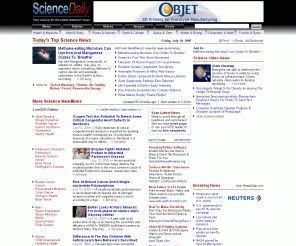
Public debates over science-associated coverage issues – such as global local weather change, vaccine necessities for youngsters, genetically engineered meals, or developments in human gene modifying – place continuous demands on the citizenry to stay abreast of scientific developments. In phrases of how these and different scientific analysis points get communicated, a minimum of 4-in-ten U.S. adults see vital problems stemming from media practices, researcher practices and the public, themselves. But when pressed, Americans put more total blame on the way media cover scientific analysis than on the way in which researchers publish or share their findings (seventy three{1afd4c3cdd86cac05842cd18beab5fd5615039e8faf5bbb3ee05e04ef8d6e544} to 24{1afd4c3cdd86cac05842cd18beab5fd5615039e8faf5bbb3ee05e04ef8d6e544}). The best of the best.By far, the 2 finest sources of science information (apart from ACSH and RealClearScience, of course!) are Nature and Science, each of which have news sections aimed toward the general public. The Economist is superb for people who are mostly excited about world information and politics however have a curiosity for science.
NewScientist and Live Science are good for true science geeks. Daily updates of the latest science news, new scientific research, technology breakthroughs, and the way the science headlines have an effect on you. Founded in 2003, Science News for Students is a free, award-successful online publication devoted to offering age-acceptable science news to learners, parents and educators. The publication, as well as Science News journal, are revealed by the Society for Science & the Public, a nonprofit 501(c) membership organization devoted to public engagement in scientific research and training. ScienceDaily features breaking news concerning the newest discoveries in science, health, the environment, expertise, and extra — from leading universities, scientific journals, and research organizations.
Pro Sports Starting Vast, Science-primarily based Experiment In Covid Re-entry
More than seven-in-ten energetic science news consumers say science and expertise museums (seventy four{1afd4c3cdd86cac05842cd18beab5fd5615039e8faf5bbb3ee05e04ef8d6e544}), science documentaries (seventy three{1afd4c3cdd86cac05842cd18beab5fd5615039e8faf5bbb3ee05e04ef8d6e544}) and science magazines (72{1afd4c3cdd86cac05842cd18beab5fd5615039e8faf5bbb3ee05e04ef8d6e544}) get the facts proper most of the time. In distinction, minorities of uninterested science information shoppers think every of those sources is correct more than half the time. And, simply sixteen{1afd4c3cdd86cac05842cd18beab5fd5615039e8faf5bbb3ee05e04ef8d6e544} of Americans understand their family and friends to be correct sources of science news, far fewer than say basic news shops and most specialty sources get the details proper about science information more often than not.
Why Covid-19 Is Both Startlingly Unique And Painfully Familiar
Republicans and Democrats (together with independents who lean to each party) are equally likely to be active science information customers (17{1afd4c3cdd86cac05842cd18beab5fd5615039e8faf5bbb3ee05e04ef8d6e544} and 18{1afd4c3cdd86cac05842cd18beab5fd5615039e8faf5bbb3ee05e04ef8d6e544}, respectively). And, roughly seven-in-ten of each celebration says they are very or somewhat excited about science news. The overwhelming majority of both groups say they usually or generally consume science-related leisure media, whether or not about felony investigations, medical exhibits or science fiction. This group also has a larger tendency to assume that every of the 9 supply sorts requested about in the survey is accurate.
This discovering is broadly consistent with a 2016 report that shows that extra Americans understand the information they get online from news organizations to be correct than say the same of people they’re close with on-line. But general shops, by a longshot, aren’t thought-about the most correct – that distinction goes to specialty sources, particularly documentaries, science magazines, and science and expertise museums. Fewer Americans frequently rely on these specialty sources for science information, but roughly half of Americans suppose that every of those three specialty sources get the facts right about science most of the time.